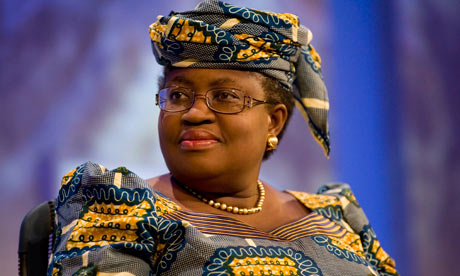Nigeria and other African countries have been advised to diversify their economies and adopt belt-tightening measures as a hedge against coming economic headwinds. The advice came from Ngozi Okonjo-Iweala, Nigeria’s minister of finance and co-ordinating minister for the economy.
This is coming on the heels of declining oil prices. Okonjo-Iweala said on Thursday, that there is a need to adopt belt tightening measures, plug leakages, and move for increased revenue and improved macroeconomic performance, adding that Nigeria cannot afford to go a borrowing.
Speaking on ‘Promoting Africa in the context of an Uncertain Global Environment’, at the 2014 Institute of International Finance (IIF) Africa Financial Summit, organised by Access Bank plc in Lagos, Okonjo-Iweala acknowledged that Bonny light crude, which traded at US$110.2 per barrel in January this year, reaching US$114.6 per barrel by June, has now slumped to about US$83 per barrel, adding that the impact of the falling oil prices would start this month.
She however stated that Nigeria has put in place a strong stabilization policy that must be able to sustain it. “Africa must truly diversify its economic base to create jobs for young people and become more self reliant and better integrated, to position itself better in an uncertain global environment,” she said. On improving macro-economic performance, she said countries in the region must aggressively look for alternative sources of revenue and stem leakages. “It is now imperative to drive up domestic resource mobilization, especially taxes. In several African countries including Nigeria, tax revenue to GDP is below 15% – the conventional IMF threshold for satisfactory tax performance,” She said. “There are many leakages and gaps to be plugged and more effective tax administration could contribute to improving revenues,” she added.
Okonjo-Iweala said Nigeria needs to identify sectors that have the potential to create jobs and provide an enabling environment to attract investment. She observed that the Federal Government is focusing on agriculture and mortgage financing, aiming to produce 200,000 mortgages per year and to double this within the next five years. Other sectors that the Federal Government is looking to tap from for economic growth are the sports industry and creative economy.
Okonjo-Iweala says the sports industry holds huge potential for Sub-Sahara Africa, considering that its population comprises mostly of the youth. “Globally, the sports industry generates $700 billion yearly, yet Nigeria is locked out of this economy,” she said. According to her, the creative industry, if properly managed, holds the key to unlocking fast growth and job creation in Africa. She observed that in the UK for example, the creative economy is worth (Great Britain Pounds) GBP 71.4 billion or 5.2 percent of GDP, and accounts for 2.55 million jobs, which is equivalent to 1 out of 12 jobs, according to the UK government’s Creative Industries Economic Estimates in 2014.
In his welcome remarks, Hebert Wigwe, group managing director, Access Bank, said “We must also take advantage of the technological revolution that is changing the face of banking all over the world, but be careful to ensure that we do not become slaves of data; that it doesn’t replace judgment and experience.” Wigwe observed that Africa is today a hub of international economic evolution; a place of tremendous innovation in financial services, telecoms and natural resources; and increasingly an important driver of global growth.




